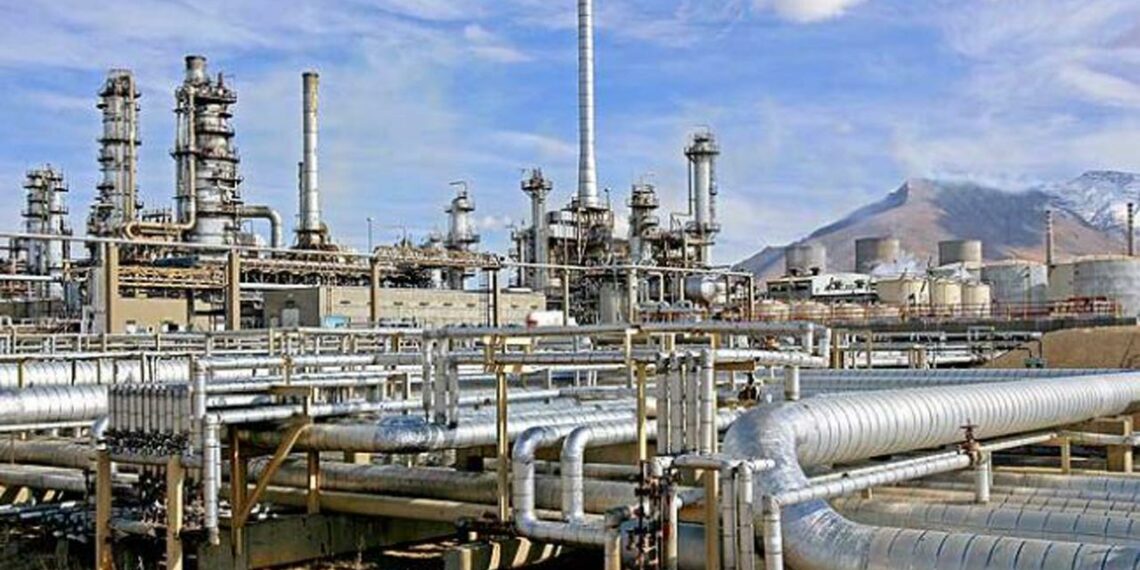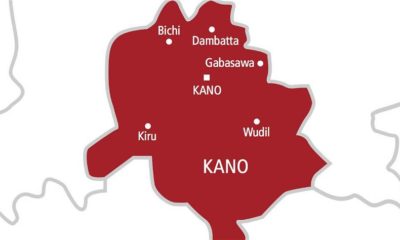Oil
Nigeria’s Oil Industry Plagued By Mismanagement, Corruption: Billions Lost In Inefficient Practices

The Nigerian government has been pumping money into its refineries in an effort to revive the facilities that have been running at a loss for years.
However, stakeholders are increasingly of the view that this strategy is not sustainable and that the government needs to invest in new refineries instead.
Nigeria has three refineries – in Kaduna, Port Harcourt and Warri – that have a combined capacity of 445,000 barrels per day (bpd).
In August 2021, the Nigerian government announced a total spending of $6.46 billion, which is approximately N2.68 trillion, for the rehabilitation of three refineries and a 20% stake in the Dangote Refinery project.
The rehabilitation will be carried out on the Port Harcourt (old and new) refinery, the Warri refinery, and the Kaduna refinery
Dangote refinery is a massive oil refinery and petrochemical project currently under construction in the Lekki Free Zone, near Lagos, Nigeria. The refinery is expected to become the largest oil refinery in Africa, as well as the world’s biggest single-train facility.
The refinery is designed to process a range of light and medium grades of crude oil, producing clean fuels such as gasoline, diesel, jet fuel, and polypropylene. The Nigeria-based Dangote Group is developing the project, with an estimated investment of $19 billion.
To aid in the project’s development, Nigeria’s Federal Executive Council (FEC) granted approval for the state-owned Nigerian National Petroleum Corporation (NNPC) to acquire a 20% minority stake in the project for $2.76 billion in August 2021.
According to a tweet from the Nigerian Midstream and Downstream Petroleum Regulatory Authority (NMDPRA), in October 2022, the Dangote Refinery project has reached 97 percent completion. The announcement was made during the authority’s reception of the company’s 2022/2023 work plan.
The NMDPRA further stated that the plan revealed that the project is in its advanced stages.
According to the federal Govt, the Port Harcourt refinery rehabilitation will cost $1.5 billion (N622.9 billion), the Warri refinery will cost $900 million (N373.8 billion), and the Kaduna refinery will cost $1.3 billion (N540 billion).
The Minister of State for Petroleum Resources, Timipre Sylva, in April 2022, stated that the rehabilitation work for the old Port Harcourt refinery would be completed by April 2023.
Once completed, the refinery will be able to refine 60,000 barrels per stream day (bpsd) of crude, although the entire complex has a capacity of 210,000 bpsd.
With April 2023 ended, there has been no record of the rehabilitation neither is there an account of how the money was spent so far.
Moreover, an analysis of the petrol subsidy fund, which is aimed at keeping the pump price of petrol low, revealed that between 2015 and 2021, at least N3.902 trillion was spent subsidizing petrol.
While there was no record of spending in 2016, N2.329 trillion was spent between 2015 and 2020, and N1.573 trillion was spent in 2021.
With the billions of dollars spent on rehabilitating the refineries in the past, there have been report of little to no success in all expenses.
Findings revealed that the $1.5 billion earmarked for the rehabilitation of the Port Harcourt refinery alone is higher than the total capital allocation to the health sector by successive governments from 2009 to 2018.
Also, the Nigeria’s spending on refinery maintenance is three times higher than the entire budgetary allocation to education between 2009 and 2018.
This has led to calls for the government to invest in new refineries instead of throwing money at dead facilities.
Energy experts have noted that Nigeria would be better off building new refineries instead of rehabilitating old ones that have been running at a loss for years.
According to Madaki Ameh, an energy expert, the $1.5 billion allocated for the rehabilitation of the Port Harcourt refinery is too much, and that the government could build a new refinery for the same amount.
“That contract is too much. You don’t need that amount of money to turn around a refinery anywhere in the world. I prefer that we build a new one,” he said.
The Group Chairman/CEO of International Energy Services Limited, Dr. Diran Fawibe, warned that without a comprehensive rehabilitation and audit, the $1.5 billion earmarked for the Port Harcourt refinery was a misplaced priority.
He called for proper rehabilitation and auditing of the entire facility to ensure that its liability remains minimal.
This has raised concerns about the misappropriation of funds meant for TAM (Turnaround Maintenance) by public officials. Several probes have been conducted by the National Assembly to investigate the mismanagement of funds meant for the maintenance of the refineries.
In May 2022, the Socio-Economic Rights and Accountability Project (SERAP) sued the President Muhammadu Buhari-led administration over the alleged failure to probe the N1.48 trillion ($3.6 billion) spent on maintaining the country’s four refineries between 2015 and 2020.
The funds are believed to have been stolen, mismanaged or diverted into private pockets. Despite the huge spending, the refineries are still not working, and fuel scarcity persists.
In the suit filed at the Federal High Court, Lagos, with the number FHC/L/CS/806/2022, SERAP is seeking “an order of mandamus to direct and compel President Buhari to investigate the spending on Nigeria’s refineries, and alleged mismanagement of public funds budgeted for maintaining the refineries since 1999.”
The high cost of importing refined products has had a significant impact on the Nigerian economy.
The Minister of Finance, Budget and National Planning, Mrs Zainab Ahmed, has revealed that the nation spends about N250 billion ($611 million) monthly to subsidize the importation of petrol into the country because all the nation’s three refineries are down.
According to her, the subsidy cost per liter ranges between N350 ($0.85) and N400 ($0.98). These funds could have been used to bridge the infrastructural deficit in Nigeria, but instead, they are being spent on fuel subsidies.
According to a report by the African Refiners Association, new refineries are being built in Africa at a cost of $6-10 billion for facilities with a capacity of 200,000-400,000 bpd.
With the $26.5 billion that the government has so far spent on the maintenance of the refineries, it could have built three new refineries of the same size.
According to findings by Biztellers, One of such refinery projects in the United States was the construction of the Motiva Port Arthur Refinery in Texas, which was completed in 2012.
The project was a joint venture between Royal Dutch Shell and Saudi Aramco, and it is one of the largest refineries in the world, with a processing capacity of 607,000 barrels per day. The total cost of the project was estimated to be around $10 billion.
Another example of a refinery project in the United States is the expansion of the Marathon Petroleum refinery in Garyville, Louisiana.
The project, which was completed in 2010, involved adding a new crude oil unit and expanding existing units, and it increased the refinery’s processing capacity to 436,000 barrels per day. The total cost of the project was approximately $3.9 billion.
Whereas Nigeria has spent more on repairing damaged refineries which has not been able to refine a single liter of oil.
Instead of securing a loan to build new refineries for the country, Early April, the federal government announced an 800 million dollar loan for subsidy removal which will be repaid in 25 years.
Following the proposed removal of the fuel subsidy, NLC and TUC expressed their opposition so far.
In April 2nd 2023, the Nigeria Labour Congress (NLC) and the Trade Union Congress (TUC) announced their conditional support for the removal of fuel subsidy in Nigeria.
The two labor bodies specified that they would only agree to the subsidy removal if the incoming administration led by Bola Tinubu takes concrete actions towards repairing and revitalizing the government refineries situated across the country, and also allows the establishment of modular refineries.
If the incoming administration fails to implement these measures, the NLC and TUC declared that they would resist the removal of subsidy and mobilize workers to stage protests against the decision.
According to the NLC and TUC, repairing and revitalizing government refineries and establishing modular refineries would increase local refining capacity, reduce fuel importation, and stabilize the price of petrol in the country.
However, The National Economic Council (NEC) have suspended the planned removal of fuel subsidy on petroleum products.
The decision was made during the valedictory Council meeting presided over by Vice President Yemi Osinbajo at the Presidential Villa, Abuja.
According to the Minister of Finance, Budget and National Planning, Zainab Ahmed, the council deliberated on the matter and agreed that the fuel subsidy cannot be removed for now.
However, the council also agreed to continue discussing the matter and to carry out necessary preparatory work in conjunction with states and representatives of the incoming administration.
She said “Council agreed that the timing of the removal of fuel subsidy should not be now. But that we should continue with all of the preparatory works that need to be done and that this preparatory has to be done in consultation with the states and other key stakeholders including representatives of the incoming administration.
With the debt increasing rapidly, more is expected to be borrowed by the incoming Tinubu administration.
In January, Patience Oniha, the Director-General of the Debt Management Office (DMO), announced that Nigeria’s total debt increase to N44.06 trillion as of September 2022.
Oil
NNPC Targets 60% Methane Emission Reduction By 2031
The Nigerian National Petroleum Company Limited (NNPC) has unveiled a bold strategy to reduce methane emissions in the oil and gas sector by 60% by 2031, with an ultimate goal of achieving net-zero emissions by 2060.
This announcement reinforces Nigeria’s leadership role under the Global Methane Pledge initiative and its commitment to tackling climate change.
The Group Chief Executive Officer of NNPC, Mele Kyari, disclosed these plans during a meeting on Thursday with Robert Leahman, the U.S. State Department’s Global Methane Program Manager, and a delegation from Deloitte.
READ MORE: Atiku Gloats Over AUN’s Achievements Ahead Of 20th Anniversary
The discussions, held at the NNPC Towers in Abuja, focused on collaborative efforts to reduce methane emissions through innovative and sustainable practices.
“Reducing methane emissions is not just an environmental necessity but also a strategic imperative for Nigeria’s energy transition. We are leveraging partnerships to adopt global best practices and innovative solutions,” Kyari stated.
Key among these efforts is a pilot project in the Niger Delta, aimed at establishing emissions baselines, mitigating methane leaks, and promoting sustainable operations across Nigeria’s energy sector.
The project, a partnership between NNPC, Deloitte, and the U.S. Bureau of Energy Resources, will utilize data-driven methodologies to pinpoint and address methane hotspots.
Robert Leahman commended Nigeria’s proactive stance, describing it as a benchmark for other nations on the continent.
“Nigeria’s leadership under the Global Methane Pledge sets a standard for the continent. These initiatives will not only help reduce emissions but also drive sustainable development in the energy sector,” he said.
Kyari highlighted the broader benefits of addressing methane emissions, noting its significance for both environmental protection and economic efficiency.
“This collaboration is a game-changer. By addressing methane leaks, we’re reducing waste, saving costs, and protecting the environment. It’s a win-win for our economy and the planet,” he added.
Oil
FG Introduces New Incentives To Revitalize Nigeria’s Oil & Gas Industry
In a strategic move to revitalize Nigeria’s oil and gas sector, the Federal Government has unveiled two key fiscal incentives aimed at attracting investment and enhancing energy security.
The announcement was made by Mr. Wale Edun, the Minister of Finance and Coordinating Minister of the Economy on Wednesday.
The first initiative, the Value Added Tax (VAT) Modification Order 2024, introduces critical exemptions for essential energy products and infrastructure, including Diesel, Feed Gas, Liquefied Petroleum Gas (LPG), Compressed Natural Gas (CNG), Electric Vehicles, Liquefied Natural Gas (LNG) infrastructure, and Clean Cooking Equipment.
Read Also: Atiku Calls For Rotational Presidency Across Nigeria’s Geopolitical Zones
These exemptions are designed to reduce living costs for Nigerians, promote energy security, and accelerate the transition to cleaner energy alternatives.
The second initiative, the Notice of Tax Incentives for Deep Offshore Oil & Gas Production, offers new tax relief options for deep offshore exploration projects.
This measure aims to position Nigeria’s deep offshore basin as a premier destination for international oil and gas investments, boosting the country’s appeal to foreign investors.
These reforms are part of a broader set of policy initiatives, known as Policy Directives 40-42, endorsed by President Bola Ahmed Tinubu.
The directives reflect the administration’s commitment to fostering sustainable development in the energy sector and enhancing Nigeria’s competitive edge in the global oil and gas market.
Business
Tinubu set to approve ExxonMobil-Seplat oil deal, expands CNG bus initiative

By Yemie Adeoye
NIGERIA’s President Bola Tinubu has announced that the protracted ExxonMobil-Seplat upstream oil divestment will be formally approved by the Minister of petroleum within a matter of days, just as he announced his government’s intention to expand the Compress natural Gas, CNG buses initiative.
The President who stated this during his Independence day nationwide broadcast stated that the move is in line with his administration’s commitment to free enterprise, free entry and free exit in investments which is the hallmark of his administration investment policy.
“Fellow compatriots, our administration is committed to free enterprise, free entry, and free exit in investments while maintaining the sanctity and efficacy of our regulatory processes. This principle guides the divestment transactions in our upstream petroleum sector, where we are committed to changing the fortune positively. As such, the ExxonMobil Seplat divestment will receive ministerial approval in a matter of days, having been concluded by the regulator, NUPRC, in line with the Petroleum Industry Act, PIA. This was done in the same manner as other qualified divestments approved in the sector.”
The President also seized the opportunity to plead with Nigerians to be patient with his administration’s reform policies. “As your President, I assure you that we are committed to finding sustainable solutions to alleviate the suffering of our citizens. Once again, I plead for your patience as the reforms we are implementing show positive signs, and we are beginning to see light at the end of the tunnel”.
“Our energy transition programme is on course. We are expanding the adoption of the Presidential Initiative on Compressed Natural Gas for mass transit with private sector players. The Federal Government is ready to assist the thirty-six States and FCT in acquiring CNG buses for cheaper public transportation.
Fellow Nigerians, while we are working to stabilise the economy and secure the country, we also seek to foster national unity and build social harmony and cohesion. Our economy can only thrive when there is peace”. he enthused.
















